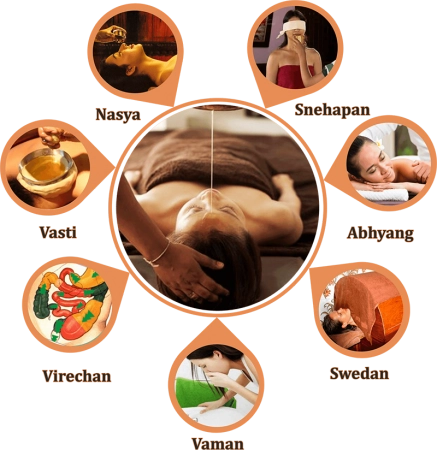Panchkarma
What is Panchkarma?
Ayurveda, the ancient science of life, has been practiced in India for over 5000 years. It focuses on maintaining good health through a balance of physical, mental, and spiritual well-being. Panchkarma, a key aspect of Ayurvedic treatment, plays a crucial role in achieving this balance. Let's delve deeper into what Panchkarma entails and how it can benefit individuals seeking holistic wellness.
The Science of Ayurveda:
- The word Ayurveda comes from Ayu, meaning life, and Veda, meaning science or knowledge.
- Ayurveda emphasizes a preventive and curative approach to health, helping individuals achieve the four goals of life: Dharma, Artha, Kama, and Moksha.
- It describes a way of life that promotes good health, disease prevention, and overall well-being.
Principles of Ayurveda:
- All matter in the universe is composed of five elements: earth, water, air, fire, and space.
- In the human body, three doshas (vata, pitta, kapha), seven dhatus (Rasa, Rakta, Mamsa, Meda, Asthi, Majja, Shukra), and three malas (Mutra, Purisha, Sweda) govern health.
- Mental well-being is influenced by the gunas (qualities) of satwa, rajas, and tamas.
- Equilibrium of doshas, dhatus, and malas is essential for maintaining good health.

Understanding Panchkarma:
- Panchkarma is a set of five procedures that help in detoxifying and rejuvenating the body.
- The five procedures include Vamana (emesis therapy), Virechana (purgation therapy), Snehana (oleation therapy), Swedana (sudation therapy), and Basti (enema therapy).
- Panchkarma aims to balance the doshas, eliminate toxins, improve digestion, and enhance overall well-being.
- It is personalized based on an individual's constitution and health condition.
Benefits of Panchkarma:
- Detoxification of the body by removing accumulated toxins and waste products.
- Restoring balance to the doshas, promoting better digestion, and improving immunity.
- Rejuvenating the body, enhancing vitality, and promoting mental clarity.
- Managing chronic conditions, alleviating symptoms, and preventing diseases.
Conclusion:
Panchkarma, an integral part of Ayurvedic treatment, offers a holistic approach to health and well-being. By incorporating the principles of Ayurveda and undergoing Panchkarma, individuals can experience a profound transformation in their physical, mental, and spiritual health. Embrace the wisdom of Ayurveda and embark on a journey towards optimal wellness with Panchkarma.
Remember, health is not merely the absence of disease but a state of complete physical, mental, and social well-being. Allow Panchkarma to guide you on the path to holistic wellness.
Incorporate Ayurvedic principles and embrace Panchkarma as a means to cleanse, rejuvenate, and revitalize your entire being. Your body, mind, and spirit will thank you for it. #Namaste
Do's
- The patient should take light diet, warm diet. Take rest and avoid strenuous activity.
- How long does panchakarma treatment take?
- The treatment time varies according to the disease and the therapy to be done.
- Is Panchakarma helpful?
- Panchakarma is helpful for both healthy and diseased individuals. It works as both detoxification and rejuvenation.
Dont's
- Pariharya Vishaya
- The various restrictions in diet and lifestyle to be observed after the panchakarma therapy.
- Parihara Kala
- The period in which the restrictions have to be followed. This period has to be followed and is equal to the days required for Panchakarma therapy.
- Loud speech
- Sitting for long duration
Frequently Asked Questions(FAQs)
Pregnant lady only, Children below 7 years, Old aged (above 75), weak. Still in some conditions it can be done where it is contraindicated under the supervision of an ayurvedic doctor.
During the panchakarma usually day sleep is avoided.
At our hospital we perform Vamana, Virechana, Nasyam, basti, kati basti, greeva basti, potli sweda, pizichil, jaluka and many other authentic and age old therapies.
The various therapies involve the use of various oils and medications on the body so the patient can bring an extra pair of clothes and a towel along.
Supervised administration of panchakarma and patients following all the do’s and dont’s does not have any harmful effects.
During certain therapies and procedures not to touch cold water is advised.


